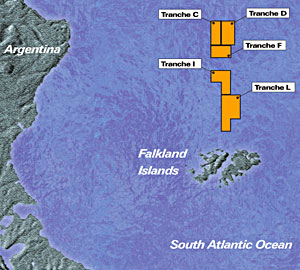 When we talk about wars for oil, the first and second Gulf wars spring to mind. First it was Kuwait and then Iraq.
When we talk about wars for oil, the first and second Gulf wars spring to mind. First it was Kuwait and then Iraq.
But cast your minds back even further to the Falklands conflict in the eighties. You could ask the question was Margaret Thatcher’s defining conflict about securing British sovereignty for the Islanders or was this ever about the Falklands’ rich resources?
Whilst the evidence points overwhelmingly in favour of the former, the second part of the equation cannot be ignored.
Even though the conflict was nearly thirty years ago, the diplomatic tension is rising again over oil exploration.
Over the last few years, exploration has gathered a pace and drilling is now due to start in February when a rig arrives.
As the Financial Times reports: “Excitement has been mounting for more than a decade that the waters around the disputed islands could contain significant quantities of hydrocarbons, and the forthcoming drilling campaign is seen as the moment of truth.”
Whether everything goes boom or bust, remains to be seen, but Argentina is certainly not happy about what is going on. Yesterday it summoned the British Ambassador in Buenos Aires to issue a “vehement protest” about the imminent start of the drilling.
The diplomatic language used was harsh. “What they’re doing is illegitimate .. it’s a violation of our sovereignty. We will do everything necessary to defend and preserve our rights,” said Argentinian Foreign Minister Jorge Taiana.
In signs of trouble ahead, the Argentine government said it will never give up its claim to the Falklands, which it calls the Malvinas.
A British embassy spokesman said: “The Falkland islands government is entitled to develop a hydrocarbons industry within its waters and it is longstanding UK government policy to support this.”
However, it is precisely these waters that Argentina calls its own.
If large scale oil deposits are found, and many people believe that there are large deposits there – the conflict can only escalate.
